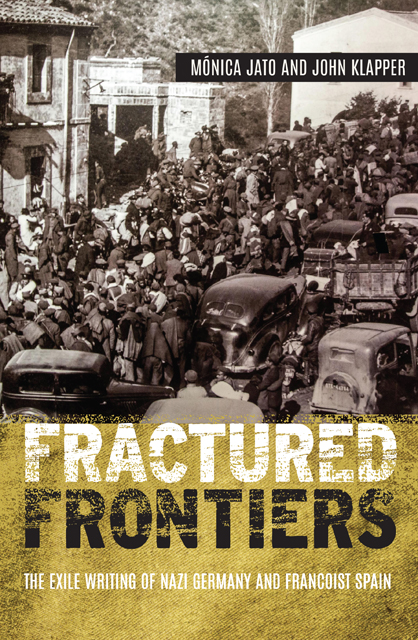Introduction
Published online by Cambridge University Press: 18 January 2023
Summary
Geographical exile from a native country in the face of an oppressive regime is a common feature of human history, and the challenges of artistic exile have been almost as well documented as those of political exile. Exiled writers’ literary responses to tyranny, in particular, range across the ages from Ovid in the first century AD, through French writer Victor Hugo and German author Heinrich Heine in the nineteenth century, the Russian-American Joseph Brodsky and the South African Breyten Breytenbach in the twentieth, to the Syrian Samar Yazbek in this century. The diverse landscape of exile in the tumultuous twentieth century offers fascinating points of comparison. This book focuses on the parallels that exist between German literary exile under National Socialism and Spanish literary exile under Francoism, with a view to identifying aspects of writing that might be extrapolated to other national contexts, thus effectively rethinking and internationalizing the discipline of exile studies.
The numbers involved are striking: approximately 500,000 persons from German-speaking Europe under National Socialism—including Germany, Austria, and the Sudentenland—went into exile. Of these, the vast majority, around 85 percent, were either Jews or were designated as such by Nazi legislation. It is estimated that literary and artistic emigration accounted for around 10,000 of those exiled, constituting for the most part the intellectual and cultural elite of the country. Similarly, in Spain, as many as 465,000 Spaniards escaped to France during the Spanish Civil War, with a little over half of them returning by 1940; by the end of the 1940s, between 125,000 and 180,000 Spanish refugees still lived there. Mexico was the next most popular destination, and approximately 24,000 emigrated there in 1939, of which it is estimated 30 percent belonged to Spain’s cultural and scientific elite (Pla Brugat, 737). The rest fled, inter alia, to Argentina (10,000), the United States, Puerto Rico, Chile, the Dominican Republic, the Soviet Union, and the United Kingdom. The three years of violent fratricidal war left almost half a million dead, and, between the end of 1939 and the beginning of 1949, about 270,000 Republicans were incarcerated in overcrowded Francoist prisons.
- Type
- Chapter
- Information
- Fractured FrontiersThe Exile Writing of Nazi Germany and Francoist Spain, pp. 1 - 13Publisher: Boydell & BrewerPrint publication year: 2020



